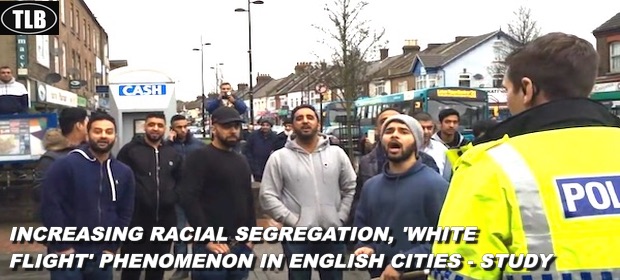
Call for action to tackle growing ethnic segregation across UK
Senior academic Prof Ted Cantle reveals figures showing rapid dwindling of white population in some areas
Anushka Asthana and Nazia Parveen
Politicians must urgently tackle the increasing ethnic segregation of many of Britain’s towns and cities, according to a senior academic, as he revealed figures showing how rapidly the white population had dwindled in urban “pockets” across England.
Prof Ted Cantle, who first authored a report into community cohesion after a series of race riots in 2001, said his new study showed that in the most extreme cases the white population had more than halved in two decades.

The white population in Slough fell from 58.3% to 34.5% between 1991 and 2011. Photograph: Karen Robinson for the Observer
Cantle, who co-authored the report with Prof Eric Kaufmann at Birkbeck, University of London, told the Guardian that white families should be encouraged to remain in ethnically diverse areas to reduce the trend.
He warned that segregated societies “breed intolerance and prejudice”, adding: “And we know the opposite is true – there is a huge amount of research that shows any form of contact does break down stereotypes.”
The leading academic said he would not describe the trend as white flight because that indicated that people were moving because of ethnic mixing, while this research only established the facts and not necessarily the causes.
“White people are leaving urban areas in a disproportionate number – and they avoid moving to diverse areas when they do move. But we can’t say that is white flight because the motivations are many and various,” he said, arguing it could be to do with the dream of a place in the country or an older cohort retiring to rural communities.
But he said interviews he had carried out in recent years as part of the study had highlighted a sense among some white people that an area they had lived in was “no longer for them”.
In one case a community cohesion officer in Yorkshire told Cantle he was the first Asian to move into a particular street and that within three years virtually every white family had gone. “Some of those families made no bones about it, they said they are moving out because ‘they’ are moving in,” he said.
The research looked at two existing studies and drew from census data from 1991, 2001 and 2011 – examining the figures in a way that has not been done before.
The report authors stressed that the findings were nuanced, with more diversity in some areas, and different ethnic groups mixing together.
However, when looking at the white population compared with all other ethnicities together it found increasing polarisation, with the steepest decline in the white population in “urban pockets” where the numbers were already well below the national average.
Some of the largest declines were in Slough, where the white population fell from 58.3% to 34.5%, in Birmingham, where it went from 65.6% to 53.1% and in Leicester, where it decreased from 60.5% to 45.1%.
In one London borough, Newham, the figure was just 16.7% in the latest data set.
But the study found even more marked changes when it examined the figures at ward level. In one part of the Blackburn and Darwen authority area, 7.8% of the population was white British, down from 42.3% in 1991.
Smaller council areas in Birmingham saw similar declines, from 40.4% to 11.2% in Small Heath and from 30.7% to 7.2% in Handsworth. The trend was repeated in parts of Bradford, Luton and across London boroughs.
Green St East in Newham had a white population of 31.6% in 1991. Twenty years later is had declined to just 4.8%. While Southall Green, in Ealing, went from 18.9% to 4.6% in the same period.
Meanwhile, there were only tiny changes in ethnic diversity in the most predominantly white areas, such as Barrow-in-Furness, mid-Devon, Bassetlaw and Mid Sussex.
ER recommends other articles by the Guardian
About the authors
Anushka Asthana is joint political editor of the Guardian
Nazia Parveen is a regular contributor at the Guardian
 Find out about our great (WOW) TLB Project Membership package and benefits, add your voice and help us to change the world!
Find out about our great (WOW) TLB Project Membership package and benefits, add your voice and help us to change the world!




